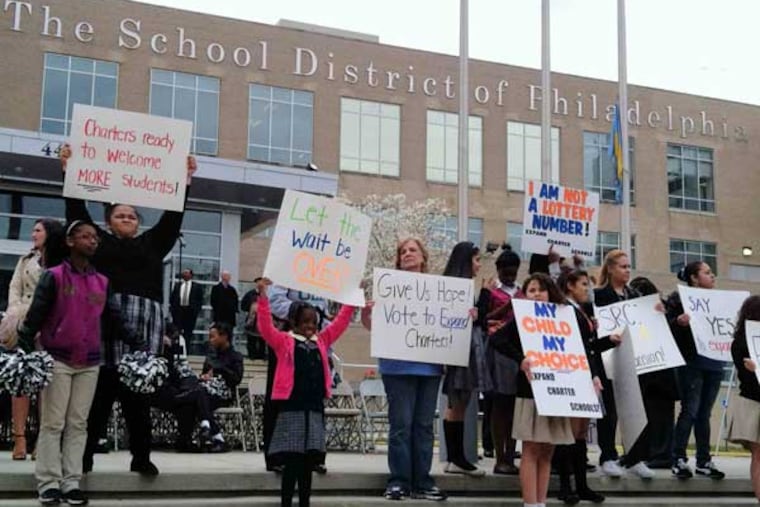More Philadelphia voters support than oppose charter schools, Inquirer poll finds
Twice as many voters support charter schools as oppose them, according to the poll. An expert called the results “a bit surprising.”

While charter schools have encountered controversy nationally over their role in public education, in Philadelphia, twice as many voters support as oppose them, according to a recent Inquirer poll.
But nearly as many voters as those who were opposed said charters were neither good nor bad for the city, in the pre-May 21 primary poll.
Martin West, a professor at Harvard’s Graduate School of Education, said the results were “a bit surprising.”
“Nationally, if we look at members of the Democratic Party, we find more opposition than you saw in Philadelphia, which is obviously a heavily Democratic city,” said West, who conducts an annual national poll on education issues.
Controversy over charters
Meant as alternatives to traditional public schools, charter schools are publicly funded but independently run. In Pennsylvania, school districts send money to charters based on enrollment. That has contributed to budget pressures in many districts.
While charter schools cannot have admissions requirements, some have been accused of unfair practices. In Philadelphia, where one-third of public-school students attend charters, the schools serve a more advantaged population than district-run schools, according to a recent study by the Education Law Center.
Charters have also faced scrutiny over their management and academic performance. In Pennsylvania, which also has a large cyber-charter presence, test scores have been uneven.
What Philadelphia voters think
Despite those issues, a plurality of the city’s voters expressed support for charters in the Inquirer poll, conduced by SurveyUSA. Asked whether the schools are good for the city or bad, 43 percent said they were good, while 20 percent said bad.
An additional 22 percent said the schools were “of no importance one way or another." And 15 percent were not sure.
Voter opinions were largely unfavorable toward Philadelphia’s school system, with 56 percent saying the schools were getting worse, compared with 11 percent who said they were getting better.
The poll collected opinions from 865 registered Philadelphia voters between April 17 and 23.
It’s unclear how their view of charters compares with previous years. Polling by the Pew Charitable Trusts in 2015 and 2013 asked Philadelphians — not just registered voters — about charters, but in a different way. In 2015, 58 percent agreed with the statement that charters “improve education options and help keep middle-class families in the city," while 33 percent agreed that charters “take too much money away from the public schools and lack sufficient oversight."
Support for charters was slightly higher in 2013, when 64 percent agreed with the first statement, and 26 percent, the second.
Because the questions and methodology were different, Larry Eichel, project director of the Pew Charitable Trusts’ Philadelphia research initiative, said he couldn’t compare Pew’s findings with The Inquirer’s.
But he said Pew’s polling found nuance. Even though most people in 2015 chose the positive statement about charter schools, when asked how to improve the city’s educational system, 55 percent said government should spend more on traditional public schools, compared with 35 percent who called for the creation of more charter schools and other options.
“To me, that reflected a certain ambivalence about charter schools,” Eichel said.
National trends
Nationally, public opinion toward charters was “remarkably consistent” for most of the last decade, with about a 2-1 ratio supporting them, West said.
But support took a big dip in 2017, when 39 percent of respondents backed the formation of charter schools — down from 51 percent a year earlier.
While some have speculated President Donald Trump’s support has harmed charters’ image, West said the 2017 decline was among Republicans and Democrats.
“That was a period where we were seeing increased debate nationally about the impact of charters on the education system,” West said. “You saw increased criticism of the charter school movement,” including from civil rights groups like the NAACP.
By 2018, though, backing for charters in West’s poll increased, growing to 44 percent with 35 percent opposed. The uptick was “driven almost exclusively by support among Republicans,” West said, of whom 57 percent were in favor and 27 percent opposed.
Among Democrats nationally, just 36 percent were in favor, and 42 percent were opposed.
In Philadelphia, The Inquirer poll also found partisan differences. Among Republicans, 61 percent said charters were good for the city, while 12 percent said they were bad. Democrats — which make up the bulk of the city’s voters — were less enthusiastic, though they still supported charters by close to 2-1, with 41 percent deeming them good for the city and 22 percent opposed.
The many people who are neutral or ‘not sure’
A full 37 percent of voters in The Inquirer poll didn’t take a side on charters, saying the schools “were of no importance" or that they were unsure.
That’s expected, West said. When pollsters ask factual questions about charters, he said, most Americans can’t answer, and those that do are as likely to get it wrong as right.
There is “still a lot of confusion about what exactly a charter school is,” he said.